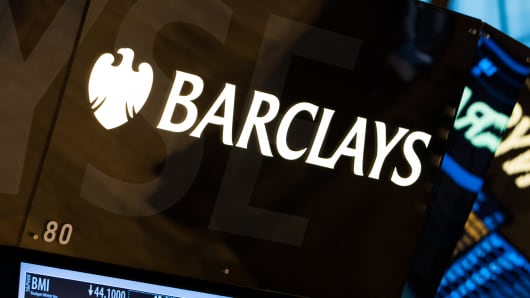A U.S. appeals court on Monday said investors may revive a lawsuit accusing Britain's Barclays of misleading them in a 2008 stock offering about its subprime mortgage exposure and ability to manage credit risks.
Reversing a lower court, the 2nd U.S. Circuit Court of Appeals in New York said investors may sue Barclays and its underwriters over a $2.5 billion offering of American depositary shares in April 2008 that lost much of its value within a year.
The lawsuit is one of many accusing major banks of inflating their share prices by concealing or being too slow to report deteriorating credit conditions on their balance sheets.
(Read more: Barclays CEO: We aren't at odds with regulators)
Barclays' offering came just four months before the London-based bank took a 2.8 billion pound ($4.4 billion) writedown on subprime mortgages and other risky debt. Soon after the writedown, it announced a large capital-raising plan.
"In a quickly deteriorating credit market, we believe the particulars about a firm's exposure to that market could assume a level of importance, and hence materiality, that may not have been the case in less economically stressful times," Circuit Judge Barrington Parker wrote for a two-judge 2nd Circuit panel.
However, the panel upheld the dismissal of claims over three offerings totaling $2.95 billion between April 2006 and November 2007, saying the plaintiffs missed a one-year deadline to sue.
U.S. District Judge Paul Crotty in Manhattan had dismissed all of the plaintiffs' lawsuit in January 2011. Monday's decision sends the case back to his courtroom.
(Read more: Barclays cash call could be warning ahead of Lloyds, RBS)
Barclays spokesman Brandon Ashcraft declined to comment.
Darren Robbins, a partner at Robbins Geller Rudman & Dowd representing the plaintiffs, said he is pleased with the decision, and looks forward to pursuing the case over the 2008 offering.
Investors had sought class-action status on behalf of purchasers of 218 million Callable Dollar Preference Shares of Barclays Bank Plc. These were originally priced at $25 each, but their value plunged to between $5 and $7 by March 2009.
'Objectively false' standard
The plaintiffs accused Barclays of failing to disclose in offering materials roughly 36 billion pounds ($56.3 billion) of credit exposure, and misleading them that the bank's risk management would prevent big losses. They said this violated Sections 11 and 12(a)(2) of the Securities Act of 1933.
Parker said that under the 2nd Circuit decision in Fait v. Regions Financial Corp, which was decided in 2011 after Crotty's ruling, a defendant may be liable under the 1933 Act for a misstatement of belief or opinion that was "objectively false and disbelieved by the defendant" when made.
(Read More: Barclays CEO: We Were Too Aggressive, Too Self-Serving)
Based on that decision, Parker said "the district court erred in stating that claims of disbelief of subjective opinions must necessarily be brought as fraud claims," which require a different burden of proof.
This didn't apply to the earlier offerings, however, because Barclays had by February 2008 made "corrective" disclosures that started the one-year period to bring a lawsuit, Parker wrote.
By waiting until March 2009 to sue, the investors waited too long, he concluded.
The case is Freidus et al v. Barclays Bank Plc et al, 2nd U.S. Circuit Court of Appeals, No. 11-2665.


